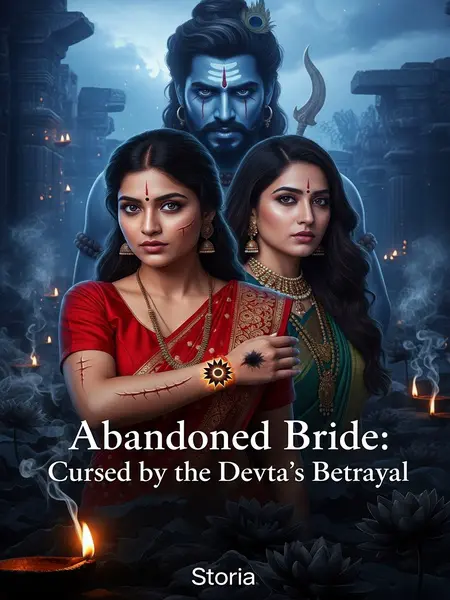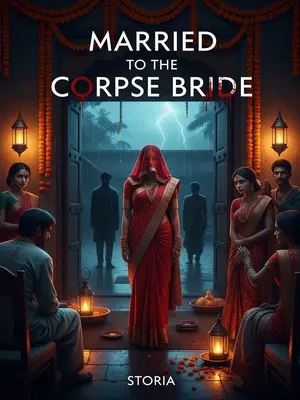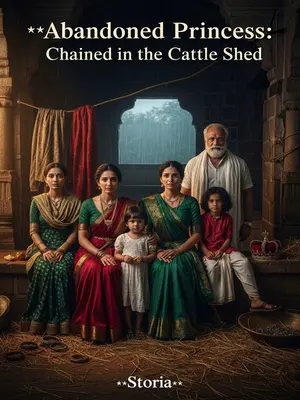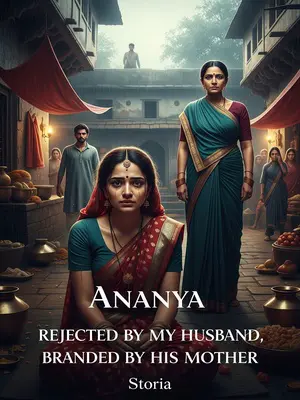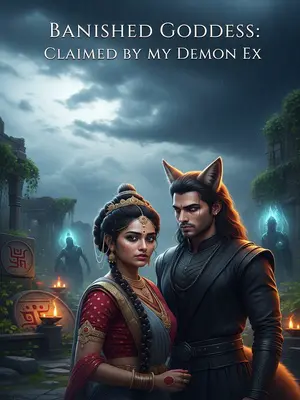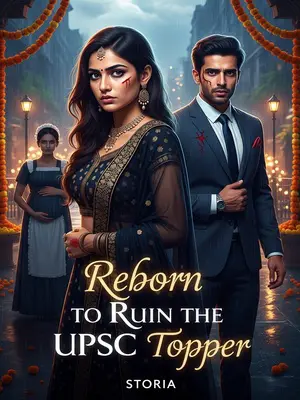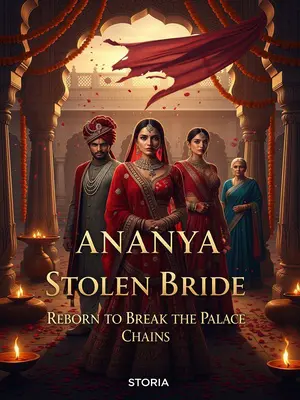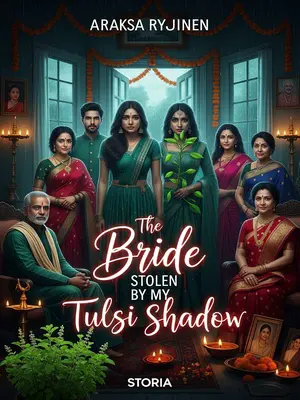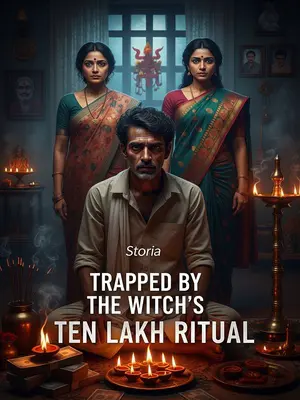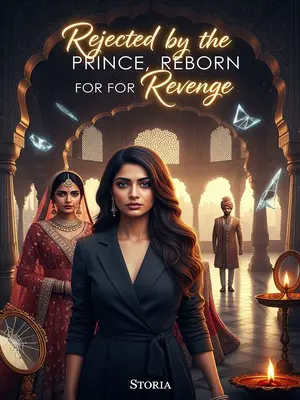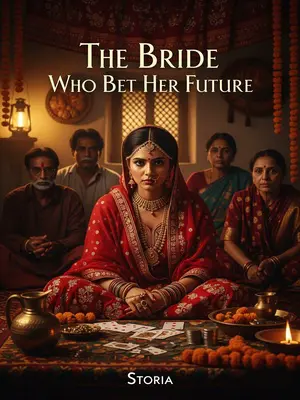Chapter 3: The Trial’s Price
1
"Priya."
His voice was like the clang of temple bells, cutting through the fog of my thoughts. Everyone in the kitchen froze. I forced myself to keep moving, afraid he’d see through my mask if I stopped for even a moment.
The Judge called my name again.
I quickly lowered my head, my hands endlessly stirring the steaming soup in the pressure cooker, and replied in a low voice, "I haven’t seen her."
I could feel all eyes on me, searching for cracks in my calm. I focused on the pressure cooker’s familiar whistling, letting it ground me. My voice was steady, but my heart raced. In the background, I heard someone clear their throat—probably Aunty Kamala, worried I’d say something foolish.
From the corner of my eye, I saw Arjun standing with his hands clasped behind his back, surveying the humble Bridge of No Return.
He looked so out of place here—divine, otherworldly, but with that same arrogance that always made me uneasy. He glanced over the chipped stone railings, the simple wooden benches, the faded rangoli at the bridge entrance. His gaze seemed to measure and judge everything, as if nothing here could ever match up to the standards of the Heavenly Sabha.
When he heard my voice, his gaze sharpened, cold as a winter night in Lucknow.
I had seen that look before—the same sharpness that froze me in place, that made my insides twist. Lucknow winters are biting, but his stare was colder still, as if he could see straight through to the core of my soul and find me lacking. I turned my face away, pretending to be busy with the soup.
Pretending to be calm, I sprinkled a little sugar into the soup. It was an earthly ingredient; Aunty Kamala’s soup was usually bitter, but I was used to adding a touch of sweetness to soften the taste.
My hand hovered over the small steel dabba of sugar. For a second, I thought of my old home—my mother used to say, 'Thoda meetha daal do, beta, zindagi ka kadva pan kam ho jaata hai.' Here, sweetness was my secret rebellion, a reminder that even in bitterness, a little kindness could slip through. I stirred carefully, hoping no one would notice.
"Yeh kya, meetha daal rahi ho? Kamala Aunty ki recipe hai na?" Arjun’s voice snapped out suddenly.
His tone startled me so much that I nearly lost my grip, my whole body trembling.
He sounded exactly as he had in my nightmares—impatient, suspicious, always looking for fault. The spoon clattered against the side of the cooker, my knuckles white as I struggled to keep from dropping it. For a moment, I felt like a schoolgirl caught cheating on an exam, all my careful defences crumbling.
It was as if I had been dragged back to the mortal world of my previous life, when Arjun tore out my spine and whispered comfort in my ear: "Meera, don’t be afraid. Your spine will grow back. Sneha can’t wait any longer..."
His hands on my back, cold and unfeeling, his lips by my ear. The pain was blinding, the betrayal sharper than any blade. I could smell the incense from the puja room, hear the distant honk of an auto rickshaw, but all that remained was the echo of his words—false promises floating in the air like dust motes in sunlight.
I was in excruciating pain, begging him to stop, but in his heart, I was never worth even half as much as Sneha.
I had called his name, again and again, voice hoarse with agony. He never listened. For him, I was a tool, a means to an end. In every small act—every cup of tea, every pressed kurta—I was trying to prove my worth, but it was never enough. Sneha was always first, even in my suffering.
He never realised I was just a lowly ghost official, with barely any power. Once my spine was torn out, I could never grow another—unless he travelled to the Heavenly Sabha and picked a Saptarangi Kamal for me.
I remember telling him, voice trembling: 'Arjun, I am not like you. My strength is small. Why are you doing this?' But he had only smiled, believing his love for Sneha justified everything. That flower—the Saptarangi Kamal—was hope, distant as the moon, and just as impossible to reach.
Otherwise, I would remain crippled forever.
The pain of that knowledge sat heavy on my heart. I would never walk straight again, never dance at the festival, never run with my sisters by the riverbank. My body was broken, and with it, my spirit began to crack.
And so I became a cripple, lying in bed day after day, bitterly waiting for Arjun to bring me the Saptarangi Kamal so I could regrow my spine.
Days blurred together. Aunty Kamala would come, pressing cool cloths to my forehead, whispering stories to distract me from the ache. But always, my eyes lingered on the doorway, hoping Arjun would appear with that impossible flower. Every footstep on the verandah made my heart leap, but it was never him.
But then Sneha, ever the mischievous one, wandered into Northward Hill, was chased by a wild beast, and suffered terrible wounds to her limbs.
They brought her back, bleeding and sobbing. The entire household was thrown into chaos. Sneha had always been trouble—curious, wild, loved by all. Her pain became the family’s pain, and once again, I was forgotten.
The Saptarangi Kamal could not only regrow a spine, but also restore flesh and bone.
That flower became the centre of all our lives. Priests were summoned, prayers offered, every day a new ritual, a new hope. The tension in the air was so thick, you could cut it with a knife. I watched from my bed, helpless, knowing what was coming.
In the Heavenly Sabha, it takes a thousand years for a single flower to bloom.
The elders recited this fact again and again, as if repetition would make a new flower appear. The waiting stretched on, each day heavier than the last. People say time heals, but in our house, it only deepened the wounds.
It’s laughable, really—after sharing a bed with me for ten years, Arjun still chose to save Sneha.
Neighbors would have called him 'behrupiya,' a man of a thousand faces. He could be tender with Sneha, ruthless with me. Ten years together, yet I was just a shadow at his side, nothing more. My friends would shake their heads, whispering, 'Kitni bewakoof hai, phir bhi usi ke peeche bhaag rahi hai.'
He told me, "You and I are not of the mortal world; our bodies are immortal. Sneha is different. I promised her parents I would take her back to the Heavenly Sabha as an attendant, to repay the kindness they showed me when they adopted me in the mortal world."
He said it so matter-of-factly, as if my suffering were a minor inconvenience. His sense of duty to Sneha’s family outweighed any feeling he might have had for me. I wanted to scream, to shake him, to make him understand what he was doing to me. But my voice was lost, swallowed by the silence between us.
"Meera, I know your heart is the gentlest. Just wait a little longer, all right?"
He always assumed my patience was endless. But even the gentlest heart can break. I wanted to shout, 'Bas karo! Main thak gayi hoon!' But instead, I nodded, as always.
He left before I could say a word.
I coughed up blood and finally understood why Eldest Didi and Second Didi lost their minds after visiting the mortal world.
I spat red into my handkerchief and stared at the stains. It was then I realised—love is not a test, but a punishment. Eldest Didi’s wild eyes, Second Didi’s silent screams—they all made sense now. The world below was a snake pit, and we were only mice.
The mortal world is utterly heartless.
Stories of romance and devotion—those are for the movies. In reality, people are selfish, love is fleeting, and kindness is repaid with cruelty. That lesson was written across my skin in scars.
So I decided to leave it behind and return to the underworld.
I packed what little dignity I had left and fled—better to face the quiet of the River of Forgetfulness than the endless pain of false hope. The underworld was cold, but at least it did not lie.
Arjun soon found me, his anger surging. He seized me by the throat. "Meera, why did you tamper with the Saptarangi Kamal?"
He stood over me, jaw clenched, gaze averted to the cracked wall as if wrestling with himself before finally lashing out. When his eyes snapped back to me, his fingers dug into my neck, the rage in his eyes burning hotter than the summer sun in Chennai. The room spun. I clawed at his hands, unable to breathe. The accusation stung worse than his grip—how could he think I was capable of such malice? But his trust had always been for others, never for me.
